Erik Valdovinos, Franklin Pierce student broadcaster, helps make history for the NCAA
|
Published: 12-28-2023 9:24 AM
Modified: 01-02-2024 3:36 PM |
Erik Valdovinos couldn’t have scripted the moment any better.
There he sat in Matthews, N.C., holding a microphone and broadcasting the NCAA men’s soccer Division II semifinals. Also a player for the Franklin Pierce University program, the 19-year-old watched in angst as his teammates took the field, tied 2-2 with Lewis University late in the second half on Dec. 7. The next goal would very likely send one of the two teams to the national championship.
In the 76th minute, FPU sophomore Antonio Lampreia Lima buried a shot into the back of the net. Valdovinos, on the call, could hardly contain his excitement. The Ravens went on to win 3-2, clinching their spot in the D-II title game.
Beyond the fact that he’d just had the chance to broadcast his team on its way to a thrilling victory in one of the biggest moments of their careers, something else was notable about the moment – Valdovinos had done the entire broadcast in Spanish.
In a sport full of international players, this was a first. FPU’s team has players from Argentina, Columbia, Portugal and Spain, but until this year, the NCAA had never before sanctioned a Spanish-language broadcast for the semifinals and national championship for men’s or women’s soccer in any division. Valdovinos and his two broadcast partners with the Ravens Sports Network (RSN), Richard Rosa and Evan Coady, called all six games in the men’s and women’s bracket across three days that week.
“It meant so much honestly,” Valdovinos said. “My family lives in Mexico, so I know what it’s like for (my teammates) to have family that wants to listen and watch their games. Obviously, their families aren’t familiar with English; neither are mine. So being able to be the person that can kind of show their families their kids playing and also commentate on them is something that was honestly an amazing experience. I would love to keep doing it.”
Kristen Nevious, the director of the Marlin Fitzwater Center for Communication and RSN, had targeted a Spanish-language broadcast for several years.
The idea initially arose with one of her former students who’d thought about doing it for some baseball games, but the pandemic quashed the plan. Then this year, she resurfaced the idea, knowing the men’s soccer team had a good chance of making another deep tournament run as the defending D-II champions.
Article continues after...
Yesterday's Most Read Articles
 Greenfield’s Yankee Siege hurls piano and more in latest trebuchet feat
Greenfield’s Yankee Siege hurls piano and more in latest trebuchet feat
 New Ipswich ZBA approves short-term rental cabins at Old Homestead Farm
New Ipswich ZBA approves short-term rental cabins at Old Homestead Farm
 Tim Gordon returns to passion for cooking with Chislehurst Kitchen
Tim Gordon returns to passion for cooking with Chislehurst Kitchen
 ConVal officials propose one athletic director position
ConVal officials propose one athletic director position
 ConVal study committee sets its course
ConVal study committee sets its course
They tested it out first during the Northeast-10 tournament in a game against American International College, and the Spanish-language broadcast had roughly five times the audience as the English feed, Nevious said. They seemed to be onto something.
When it became clear Franklin Pierce would be advancing to the national semifinals, Nevious reached out to the NCAA to explore the idea further. After ironing out the details – including that the students would need to broadcast all six games for both the men’s and women’s semifinals and championship – RSN had the green light to move forward.
There just wasn’t much time before the first game kicked off. Nevious had called Valdovinos the day before to share the news. As a reserve player for the team, he wasn’t expecting to take the field, which put him in a perfect position to grab the microphone.
“That kind of gave me less than 24 hours to prep for four games that I had to do the following day on Thursday,” Valdovinos said. “So that was a little bit of a challenge, but thankfully, I had a lot of help from the other RSN guys back at school. They were able to help me out and help me gather some facts, and that was really helpful from them.”
After four games on Dec. 7 and two championships on Dec. 9, Valdovinos, Rosa and Coady had successfully navigated through the gauntlet of a schedule. Even sweeter, Valdovinos was able to celebrate FPU’s championship after the Ravens beat Colorado State University Pueblo, 4-0, to win the program’s third national title.
“They’re very proud of themselves,” Nevious said. “They don’t realize how significant it might’ve been. It is, in my book. ... They did it, and they connected with the team and the students and the families.”
Rachel Burleson, the university’s athletic director, added that it was an important milestone for inclusivity.
“I want them to know that our goal is to always be inclusive of everyone and making sure that everyone has the same opportunities,” she said. “We have a large population of Spanish-speaking student-athletes who are from Spanish-speaking countries, and their parents don’t speak English or a very limited amount of English. Our idea and thought was to allow those families to be a part of something as well. Our coaches have built a tremendous program with really, really amazing student-athletes, so their families should be a part of it, no different than our English-speaking families.”
The NCAA received lots of positive feedback on the broadcasts, she added, and it’s something they’re hoping to do again moving forward. More than anything, the biggest obstacle to having a Spanish-language broadcast in the past has been the lack of anyone able to broadcast the games.
Valdovinos certainly helped fill that void.
“I think Erik and his personality and what he’s done on this broadcast, especially only being a sophomore, I think has been tremendous for him and for the institution,” Burleson said.
And for the sophomore from Canton, Mass., it was an experience he’ll always remember.
“It was just a great time to be able to be an outlet for those families to listen in on their kids and be able to experience this championship win in a language that they’re familiar with and are comfortable with,” Valdovinos said.

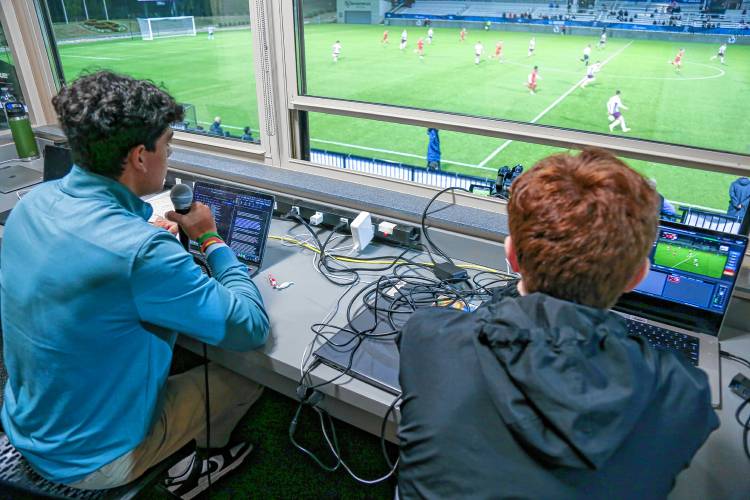
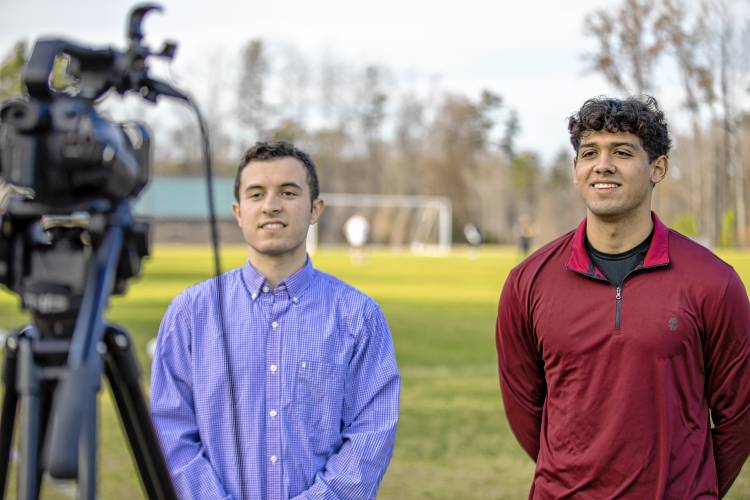
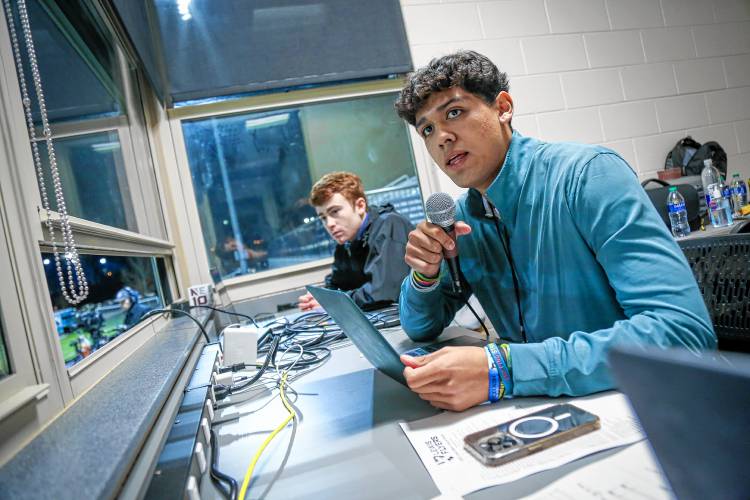
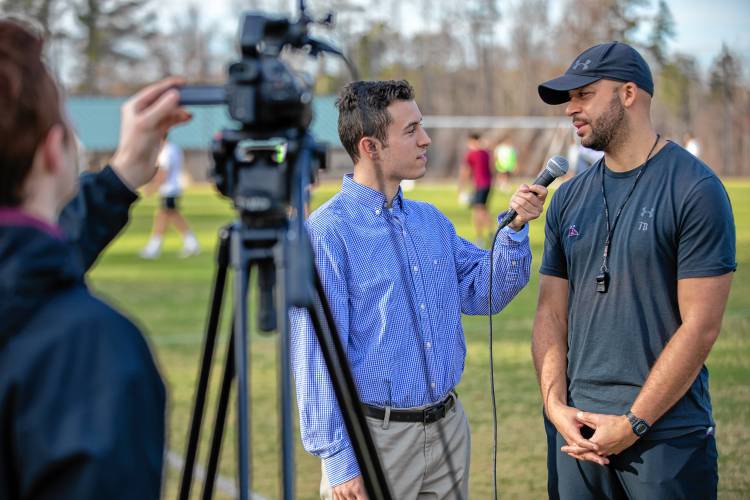
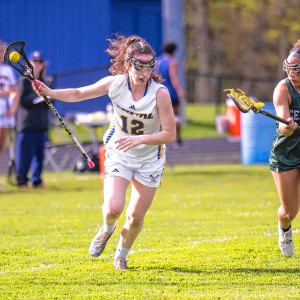 ConVal girls’ lacrosse shows potential, despite record
ConVal girls’ lacrosse shows potential, despite record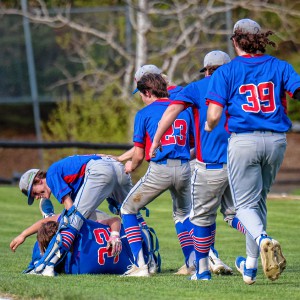 Mascenic baseball scores walkoff win over Wilton-Lyndeborough
Mascenic baseball scores walkoff win over Wilton-Lyndeborough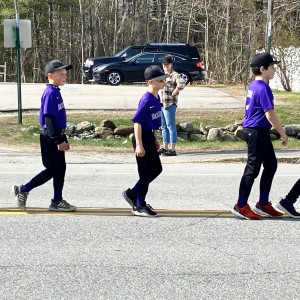 Mt. Monadnock Little League celebrates opening day
Mt. Monadnock Little League celebrates opening day 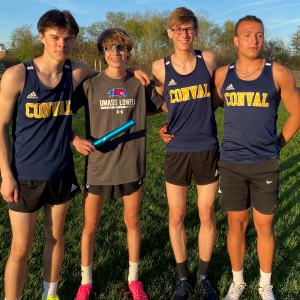 LOCAL SPORTS RECAP: ConVal track takes first and second
LOCAL SPORTS RECAP: ConVal track takes first and second
